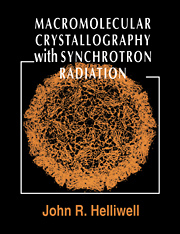Book contents
- Frontmatter
- Contents
- Preface
- Acknowledgements
- A note on units
- 1 Introduction
- 2 Fundamentals of macromolecular crystallography
- 3 Fundamentals of macromolecular structure
- 4 Sources and properties of SR
- 5 SR instrumentation
- 6 Monochromatic data collection
- 7 The synchrotron Laue method
- 8 Diffuse X-ray scattering from macromolecular crystals
- 9 Variable wavelength anomalous dispersion methods and applications
- 10 More applications
- 11 Conclusions and future possibilities
- Appendix 1 Summary of various monochromatic diffraction geometries
- Appendix 2 Conventional X-ray sources
- Appendix 3 Fundamental data
- Appendix 4 Extended X-ray absorption fine structure (EXAFS)
- Appendix 5 Synchrotron X-radiation laboratories: addresses and contact names (given in alphabetical order of country)
- Bibliography
- References
- Glossary
- Index
1 - Introduction
Published online by Cambridge University Press: 23 November 2009
- Frontmatter
- Contents
- Preface
- Acknowledgements
- A note on units
- 1 Introduction
- 2 Fundamentals of macromolecular crystallography
- 3 Fundamentals of macromolecular structure
- 4 Sources and properties of SR
- 5 SR instrumentation
- 6 Monochromatic data collection
- 7 The synchrotron Laue method
- 8 Diffuse X-ray scattering from macromolecular crystals
- 9 Variable wavelength anomalous dispersion methods and applications
- 10 More applications
- 11 Conclusions and future possibilities
- Appendix 1 Summary of various monochromatic diffraction geometries
- Appendix 2 Conventional X-ray sources
- Appendix 3 Fundamental data
- Appendix 4 Extended X-ray absorption fine structure (EXAFS)
- Appendix 5 Synchrotron X-radiation laboratories: addresses and contact names (given in alphabetical order of country)
- Bibliography
- References
- Glossary
- Index
Summary
Macromolecular crystallography is a very powerful method used to study complex biological systems. The structures of a wide variety of proteins, nucleic acids and their assemblies have been determined at atomic or near-atomic resolution. As a result, a detailed understanding has been gained of various living processes such as enzyme catalysis, the immune response, the encoding of hereditary information, viral infection and photosynthesis.
The first X-ray diffraction photograph ever taken was from copper sulphate by Friedrich and Knipping at von Laue's suggestion in 1912. In the following year W. L. Bragg deduced the crystal structure of sodium chloride from Laue photographs. A variety of relatively small molecular structures were then solved at an increasing rate.
The first X-ray diffraction pictures of a protein crystal were taken in 1934 by Bernal in Cambridge, but in those days the data quality was crude and the techniques for deriving a crystal structure of a macromolecule from the X-ray data were not sufficiently developed. The advent of the computer has been a critical development.
The first protein structures to be determined were myoglobin and haemoglobin in the late 1950s by Kendrew et al (1958) and Perutz et al (1960). From then on a steadily increasing number of protein structures have become known.
Information
- Type
- Chapter
- Information
- Publisher: Cambridge University PressPrint publication year: 1992
